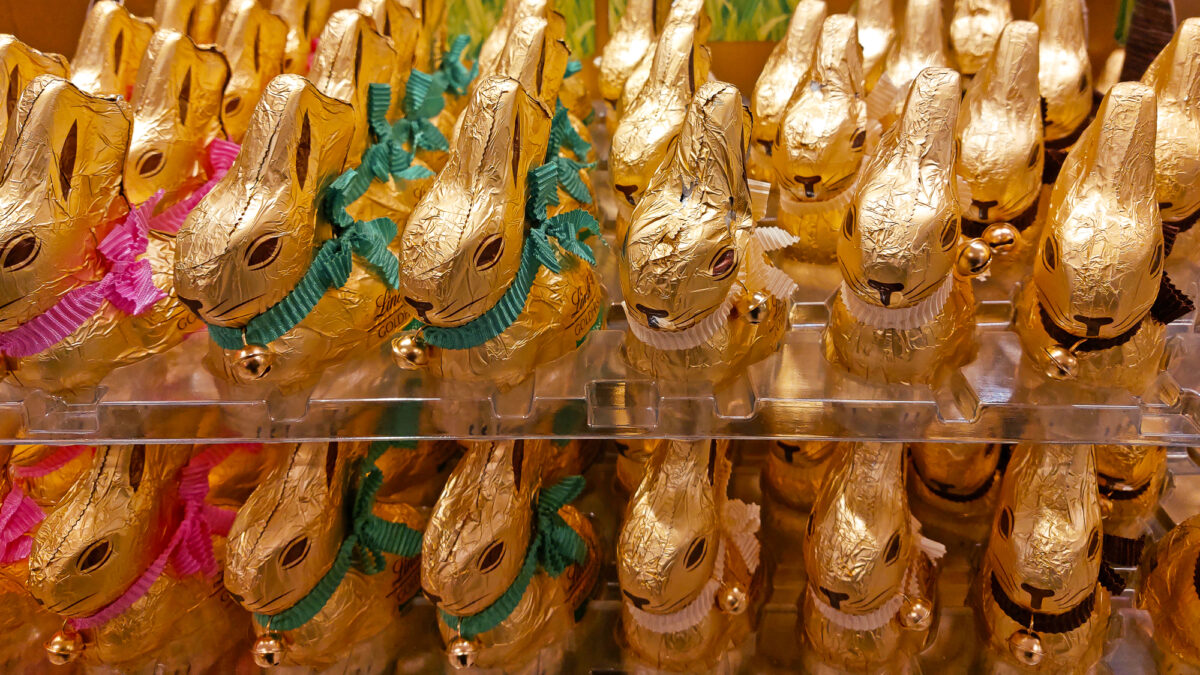Tesco, Krueger and KMart Australia flunk the sustainable egg test while niche chocolates lead the way in Be Slavery Free’s 5th Chocolate Scorecard
As you prepare to fill your Easter basket with chocolate eggs and bunnies, the Be Slavery Free Scorecard can help you select chocolates and companies that are good for the environment and the people who grow and make them worldwide.
The new Scorecard rates 38 large and medium companies, nine small companies, and 16 retailers, from Lindt and Nestlé to Godiva and Ferrero, on how they rank across six issues, including deforestation and climate change, and whether companies have solid anti-slavery policies and pay their farmers a living wage.
And the Good Egg Award goes to…
Three companies — Original Beans, Beyond Good, and Ritter Sport — received Good Egg Awards for leading the industry in policy and practice across all issue areas. Dutch brand Tony’s Chocolonely received an achievement award for leading the sector for each of the five years of the Scorecards and Chocolatemakers (organic) won an innovation award for a creative and innovative approach to reducing the company’s carbon footprint. Only seven small companies are 100% certified organic, adhering to stringent practices that exclude chemicals.
Bad Eggs
Krueger and Tesco received Bad Egg Awards for their lack of transparency, making sustainability claims without publicly verifying them. Kmart Aus/NZ (including Target) was at the very bottom of the rankings for every issue area.
Far from sweet
But even the best chocolate producers still work in a highly exploitative industry where little of the profit trickles down to farmers and laborers. While the chocolate industry is undergoing significant change, certain aspects, such as farmer poverty and high pesticide use, remain unchanged despite global campaign efforts to improve them. “Chocolate is a sweet treat that we often share with people we love to celebrate a special occasion or indulge in a sweet moment,” said Fuzz Kitto, co-director of Be Slavery Free.” But usually, the conditions in which it is made are far from sweet.”
“Chocolate is a sweet treat that we often share with people we love to celebrate a special occasion or indulge in a sweet moment,” said Fuzz Kitto, co-director of Be Slavery Free. “But usually, the conditions in which it is made are far from sweet.”
The most alarming news is that only six of the 63 companies evaluated say they pay 100% of the farmers in their supply chain enough for a decent living. And that is wreaking havoc on the environment.
“When cocoa farmers and their communities live in poverty, they deforest to clear more land to grow more cocoa. They rely on family and unpaid labor (child labor and forced labor) to make ends meet. As a result, our environment is harmed, and children’s future opportunities are squandered,” says Kitto.

Source: Washington Post
Work, health and gender equality standards remain abysmal in West Africa, where 70% of the cocoa is grown, mainly in Côte d’Ivoire and Ghana.
Cocoa farming is an unforgiving business
Scorecard research also shows scant improvement in the condition of the industry’s two million child laborers, barely over ten years old and making little more than $2 a day. Critical tasks identified include clearing virgin forest, planting cocoa seedlings, and thinning, and pruning with hazardous, long and short cutlasses and bamboo poles with cutting knives.
Additional hazards include climbing trees with loads of dried cocoa beans that may weigh 120 pounds or more. Cuts, deep lacerations and severed fingers are common.
Over a third of all child laborers are also exposed to harmful pesticides. Children as young as 14 carry backpack sprayers containing liquid pesticides, while children as young as ten help prepare applicators during the mixing, loading and application processes, resulting in pesticide exposure.
“It is essential that the chocolate industry continues to prioritize sustainability, fair labor practices and environmental conservation,” Kitto said. This includes ensuring fair compensation for farmers, promoting responsible sourcing practices, reducing pesticide use and safeguarding against child labor, forced labor and deforestation.
“It is essential that the chocolate industry continues to prioritize sustainability, fair labor practices and environmental conservation.”
Despite more companies reporting on gender equity, none of the companies and retailers reviewed received total points for gender equity practices.
Big profits for big chocolate
All this cost-cutting is leading to record profits for the chocolate industry. This year, the chocolate sector is expected to generate around $254 billion, driven by record-high prices for cacao. That comes to about one kilogram of cacao consumed by each person of the planet’s 7.7 billion people.
However, little of that profit trickles down to farmers.
There is some progress. The Scorecard team found that many smaller chocolate companies and key sustainability staff know their farmers well, which is evident in their policies, programs and evaluation methods.
Improvements in traceability of chocolate sourcing are also improving in response to the European Union’s new Deforestation Regulations (EUDR).
Of the companies researched, 89% have a traceability commitment, most with target dates in 2024 or 2025, coinciding with the start of the EUDR. Still, of the big chocolate companies that reported data, only 41% can currently trace enough cocoa back to its farmer group for EUDR compliance and 59% of the big companies are still short of EUDR compliance on traceability. This amounts to a gap of almost 700,000 tons of cocoa beans.
The Be Slavery Free Scorecard is a partnership effort with Australia’s Macquarie University, the University of Wollongong, and The Open University in the UK. Non-government organization partners include WWF, the National Wildlife Federation, the Tear Fund and the Child Labor Coalition. The team provides detailed methodology, questions to companies and how they rate their efforts as part of the Scorecard process.
Featured image: Original Beans cacao


